MAY 15, 2024
More than three-fourths of Americans fear abuses of artificial intelligence will affect the 2024 presidential election
Many are not confident they can detect faked photos, videos or audio
Seventy-eight percent of Americans expect that AI will be used to manipulate social media, create fake information and convince people not to vote in this year’s presidential election. About 7-in-10 think most voters are unable to detect fake photos and video and nearly half doubt their own abilities to spot digitally altered media.
Those are some of the findings of a national survey on AI & Politics conducted April 19-21, 2024, by the Imagining the Digital Future Center and the Elon University Poll. The survey included 1,020 U.S. adults and has a margin of error of 3.2 percentage points.
PRIME NUMBERS

78% Believe it is likely that AI will be abused to affect the presidential election outcome

39% Believe the use of AI will mostly hurt the election process; just 5% think it will help

46% Say candidates who maliciously alter or fake photos, video or audio should be prevented from holding office

69% Say they are not confident that most voters can detect fake photos. Similar shares worry about others’ ability to detect fake videos and audio
- 73% of Americans believe it is “very” or “somewhat” likely AI will be used to manipulate social media to influence the outcome of the presidential election – for example, by generating information from fake accounts or bots or distorting people’s impressions of the campaign.
- 70% say it is likely the election will be affected by the use of AI to generate fake information, video and audio material.
- 62% say the election is likely to be affected by the targeted use of AI to convince some voters not to vote.
- In all, 78% say at least one of these abuses of AI will affect the election outcome. More than half think all three abuses are at least somewhat likely to occur.
“Voters think this election will unfold in an extraordinarily challenging news and information environment,” said Lee Rainie, director of Elon University’s Imagining the Digital Future Center. “They anticipate that new kinds of misinformation, faked material and voter-manipulation tactics are being enabled by AI. What’s worse, many aren’t sure they can sort through the garbage they know will be polluting campaign-related content.”
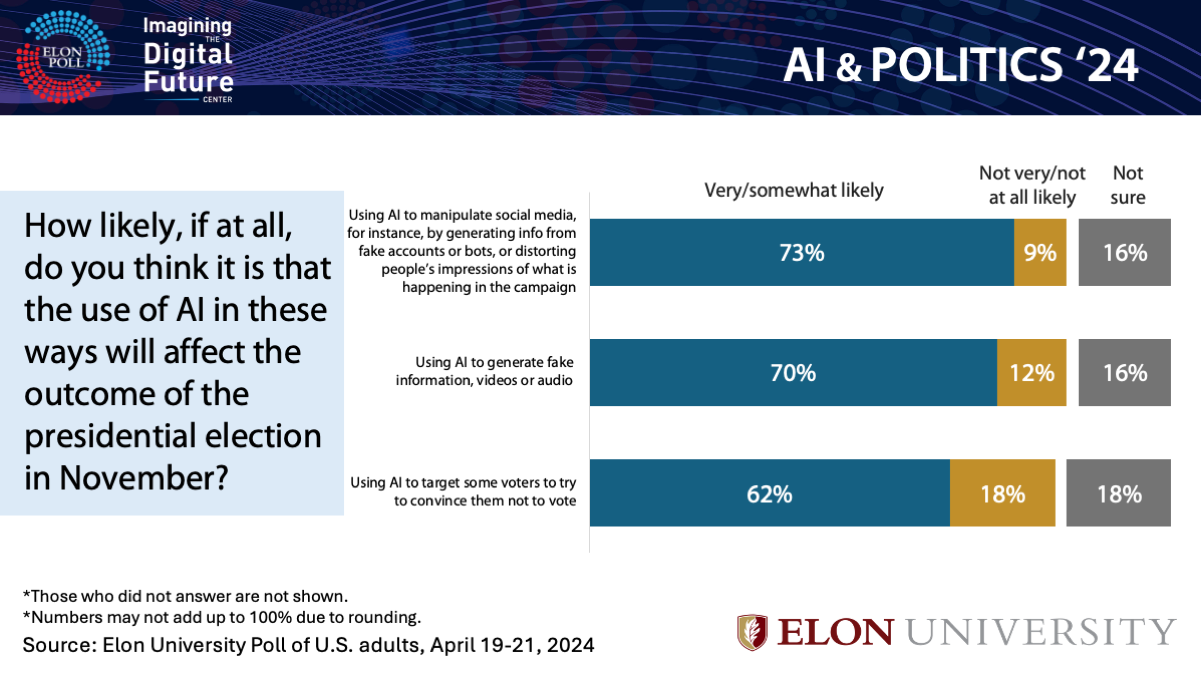
Fully 78% of Americans believe that at least one of these abuses of AI is “very” or “somewhat” likely to affect the outcome of the election. There are no notable partisan differences here. Those aligned with each party are equally likely to be concerned. Those most likely to express concerns include adults 65 and older, White people, those with at least some college education and those living in households earning more than $100,000. Those who say they are not sure of the impact of AI in these areas are more likely to be young adults ages 18-34, Black people and Hispanics, those in households earning under $50,000 and those with a high school education or less.
These concerns put Americans in a punishing frame of mind. Fully 93% think some penalty should be applied to candidates who maliciously and intentionally alter or fake photos, videos or audio files.
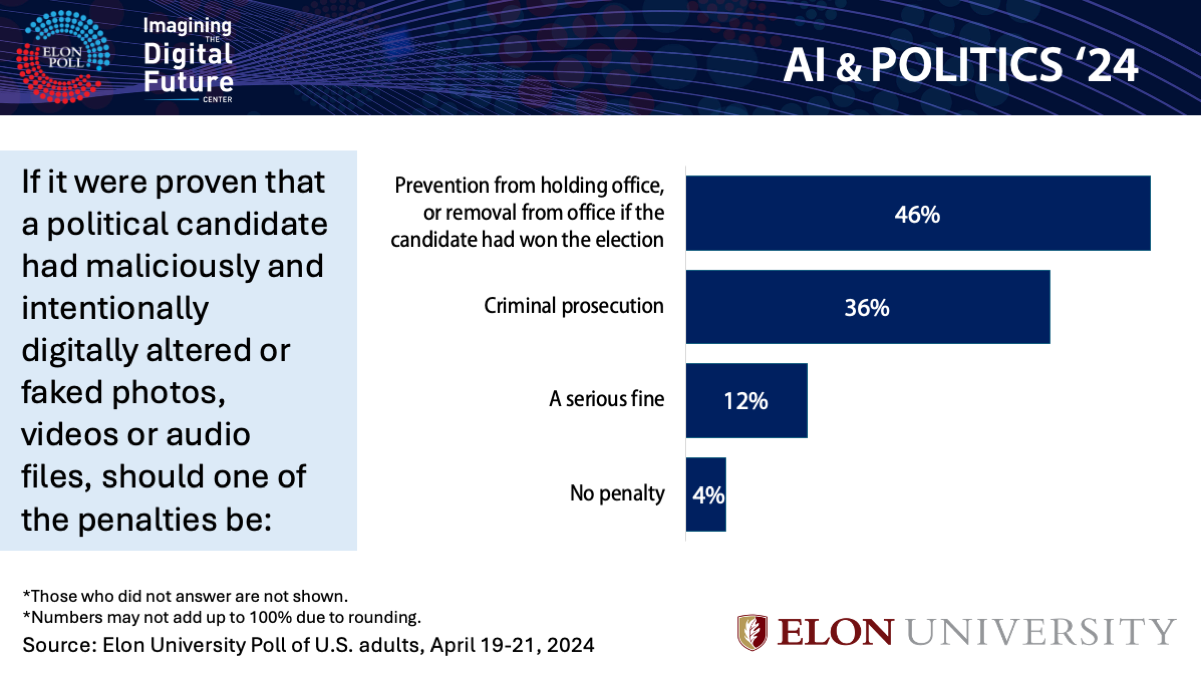
Fully 93% of Americans want to punish candidates who are caught maliciously and intentionally altering or faking photos, videos or audio files during the election. Some of the patterns in the data:
Prevention from holding office is particularly favored by women.
Prosecution is particularly favored by those in households earning more than $100,000 and those with college educations.
A serious fine garners more Republican support than from Democrats (17% vs. 8%).
No penalty has only single-digit support across different groups.
By a nearly 8-1 margin, more Americans feel the use of AI will hurt the coming election than help it: 39% say it will hurt, 5% think it will help. Some 37% say they are not sure.
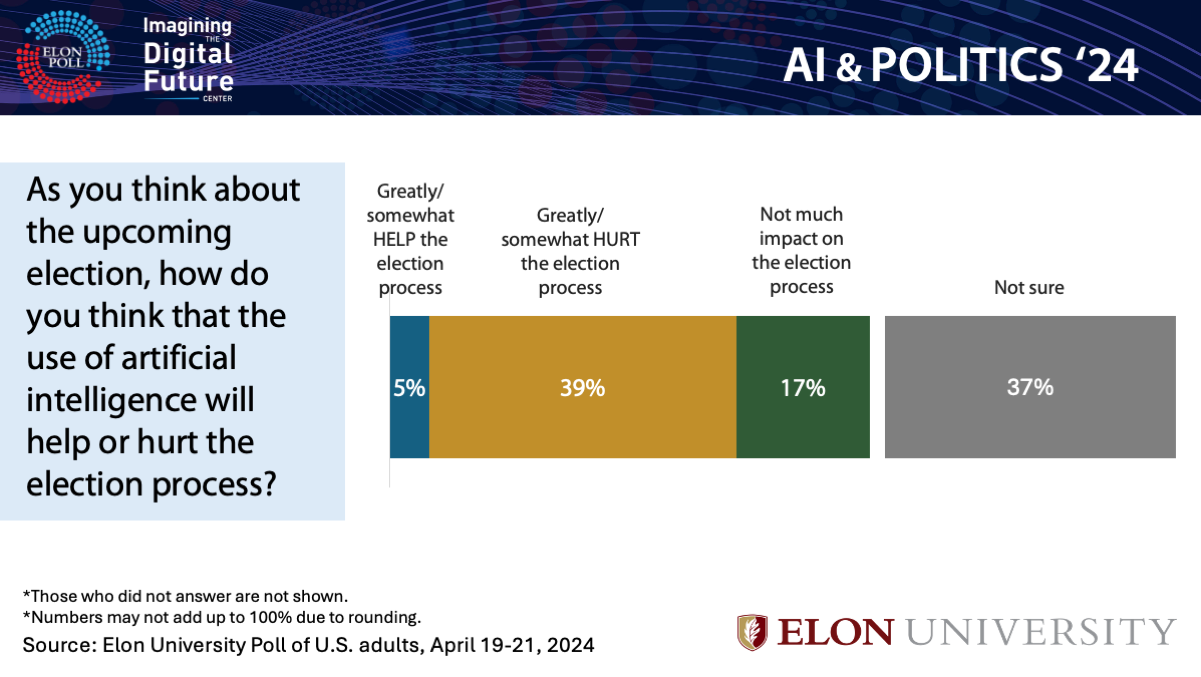
By a nearly 8-1 margin, more Americans feel the use of AI will hurt the coming election than will help it. Still, there are notable shares of adults who are not sure what the impact might be or feel that the use of AI will not have much impact on the election process. Republicans are more likely than Democrats that the use of AI will “greatly” or “somewhat” hurt the process (49% vs. 38%). Those most likely to say they are not sure of the impact are those with high school educations and Black Americans.
Americans’ concerns about the use and impact of AI systems occur in a challenging and confusing news and information environment. Fully 52% of Americans are not confident they can detect altered or faked audio material; 47% are not confident they can detect altered videos; and 45% say they are not confident they can detect faked photos. They have far less faith in the capacity of others to detect fakes: About 7-in-10 are not confident in most voters’ ability to detect photos, videos and audio that have been altered or faked.
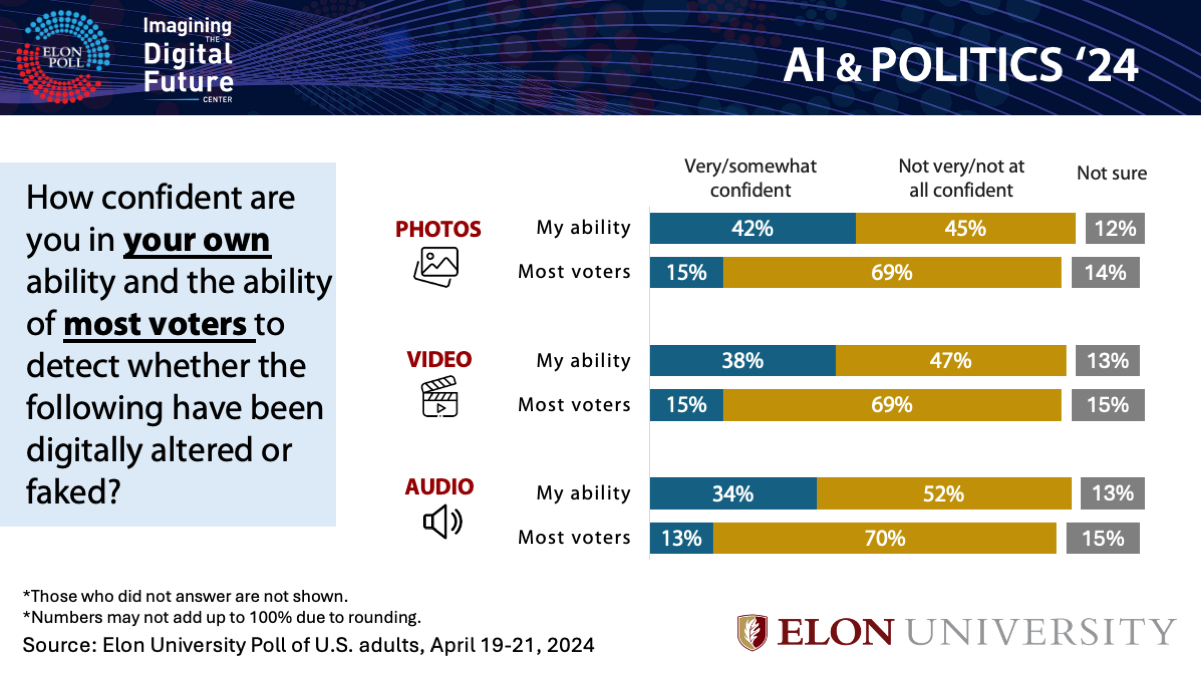
Americans are not particularly confident in their own abilities to detect altered or faked videos, photos and audio files. And they have much less confidence in others’ abilities to discern fakery. Democrats are more likely than Republicans to be confident in their own abilities to detect faked videos and audio files; men are more confident than women; and those ages 18-34 are more confident than older people. People’s skepticism of others’ abilities to detect fakes runs especially high among those ages 35 and older, those in households earning $50,000 or more, those with at least some college education and White people. When it comes to adults’ judgments about others’ abilities to discern fake material, there are not any notable partisan differences. Members of both parties are equally likely to worry about others’ capacities.
Americans also worry about the overall news and information environment of politics. Some 61% of adults say they are “very” or “somewhat” confident they will get accurate and trustworthy information during the election. But a quarter (28%) are “not very” or “not at all” confident that will be the case and 10% are not sure. Strikingly, 57% of Americans are not confident that other Americans will get accurate and trustworthy information during the election. Just 28% of Americans are confident most voters will get accurate and trustworthy information during the election.
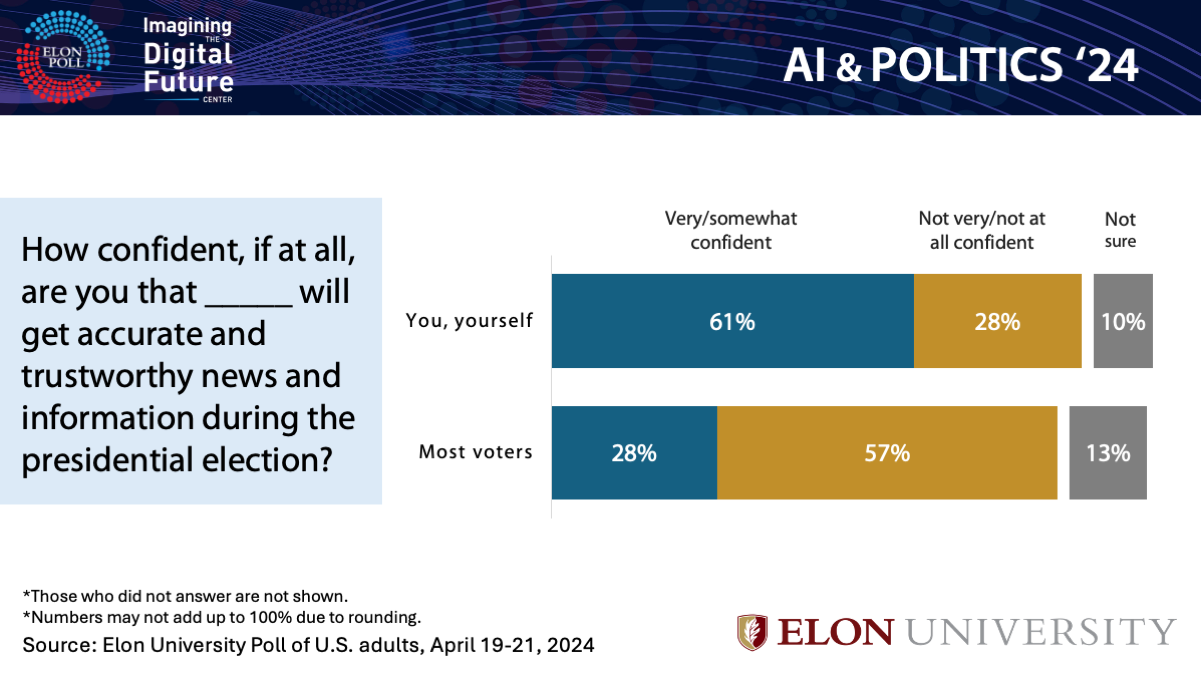
Republicans are more likely to worry about the current news and information environment. For instance, Republicans are much less confident than Democrats that they themselves will get accurate information during the election (39% vs. 17%). Republicans are also less confident than Democrats that most voters will get trustworthy political information. The gap is 68%-50%. Beyond partisan differences, men, those age 65 and older and those with college degrees are particularly likely to have confidence they can get accurate political news. On the opposite side, those with lower confidence that most voters will get accurate information include the college-educated, those in high-income households and White people.
When it comes to their own information needs, about half (53%) feel it is “very” or “somewhat” easy to get the political news and information they want, while a fifth (19%) say it is very or somewhat difficult. Another 18% say they usually don’t seek out political news.
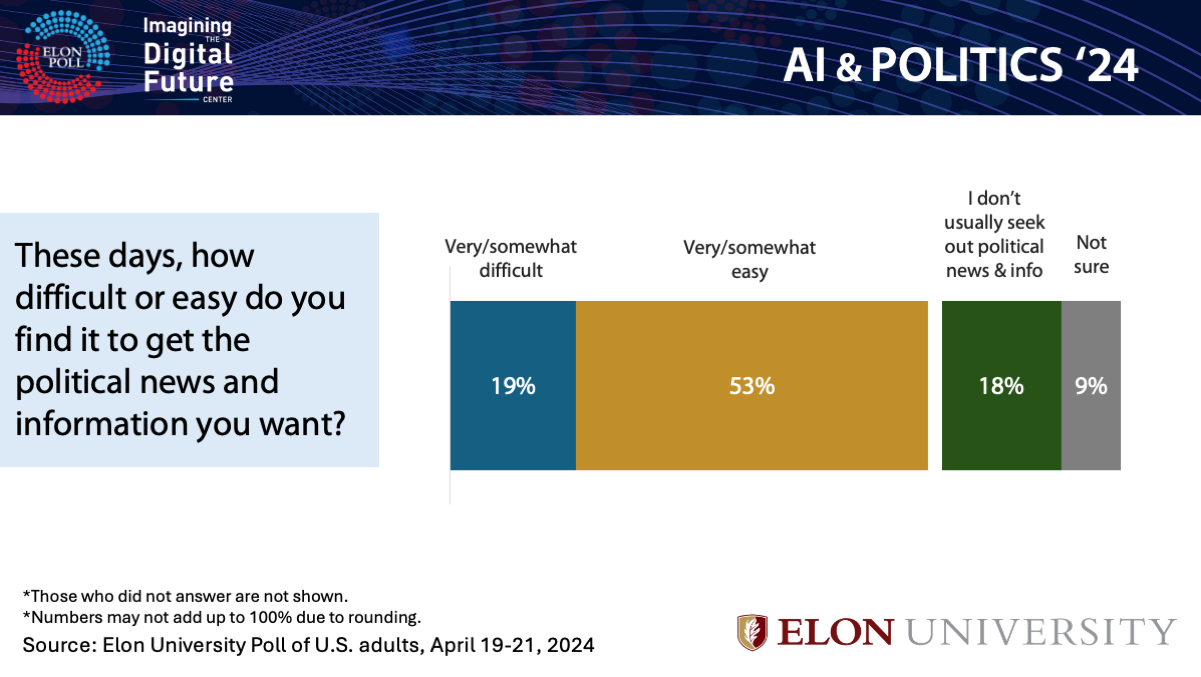
Roughly half of Americans say they find it “very” or “somewhat” easy to get the political news and information they want. Still, it is noteworthy that about a fifth of Americans find it difficult. Some 68% of Democrats say they find it easy, compared with 47% of Republicans. Meanwhile, 27% of Republicans say they find it hard, compared with just 12% of Democrats. Others who say it is relatively easy for them include men, those ages 35 and older, and those with at least some college education.
Americans are not especially sure that either Republican Donald Trump or Democrat Joe Biden can do a better job handling these tech-related issues: dealing with social media, dealing with AI, leading the military in adopting AI and competing with other countries in AI. About a quarter or more of adults think neither Trump nor Biden would do a better job, and notable shares say they are not sure about how either is likely to perform.

Predictable differences by partisanship show up in the survey data across these issues. Strong majorities of Republicans support Trump and strong majorities of Democrats support Biden. Four questions on this survey are most relevant to AI and politics. Again, partisanship dominates people’s choices when it comes to their views about which candidate can do a better job dealing with AI, with social media, competing with other countries in AI, and leading the military in adopting AI. For example: 53% of Republicans think Trump would do a better job dealing with the development of AI, while 3% think Biden. And 55% of Democrats back Biden here, compared with 4% who pick Trump.
Majorities of Democrats, Republicans and independents say they are not sure if these systems are fair or biased to different groups. At the same time, there are some notable differences among partisans who do have views. Republicans are generally more wary of AI models than Democrats are. For instance, Republicans are more likely to think AI systems are biased against their views, and they also are more likely to think that AI systems are biased against Democrats, men and White people. Democrats are somewhat less likely than Republicans to think those biases exist in AI systems.
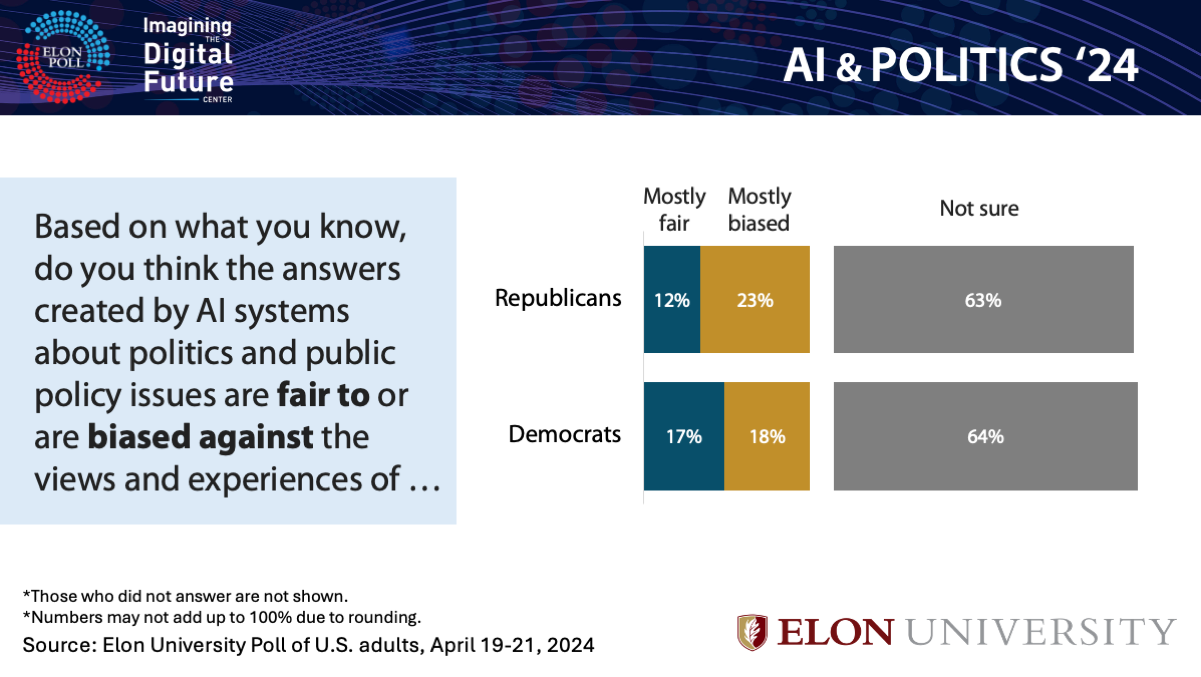
One major concern about bias in AI systems is whether large language models (LLMs) generate answers to user queries that are fair and unbiased against some groups and their points of view. In this survey, we were particularly interested in how people assessed the answers of LLMs about politics and policy issues. AI systems are so new that it is not surprising that most partisans say they are not sure if there is bias in AI systems’ answers. Still, there are some notable differences among partisans who do express opinions on questions related to bias. Republicans are generally more wary of AI models than Democrats are. For instance, Republicans are more likely than Democrats to think these systems are biased against Republicans (the margin is 36%-15%). At the same time, Republicans are also more likely than Democrats to think the systems are biased against Democrats. The gap is 23%-14%.
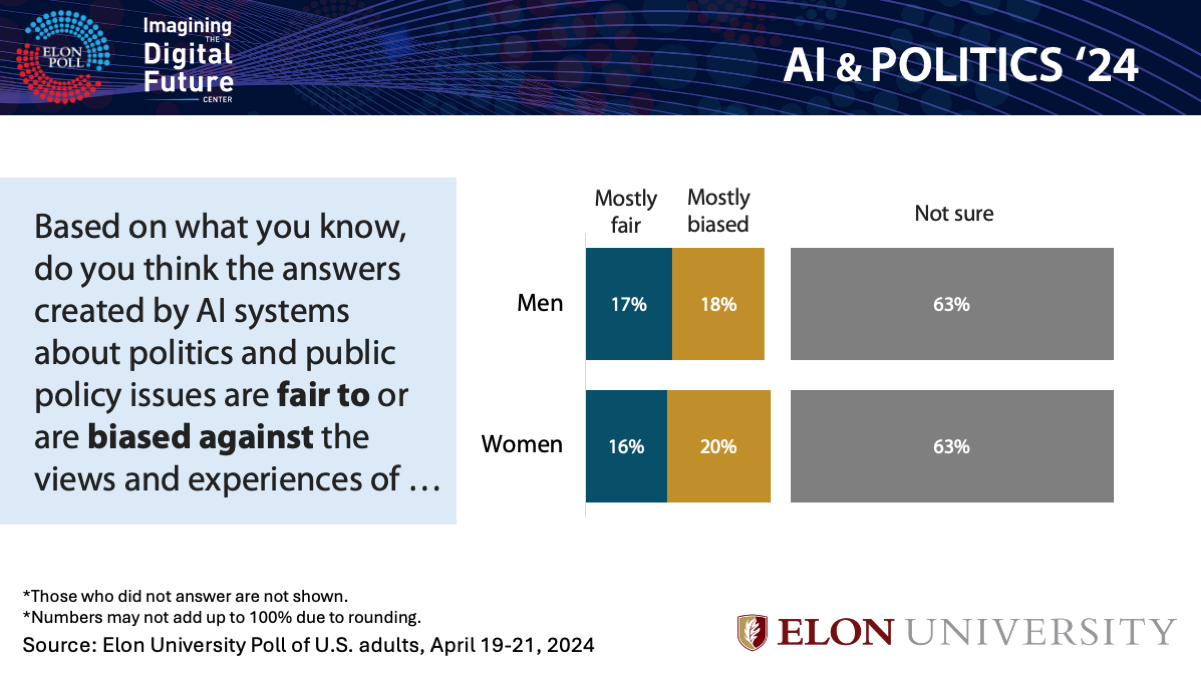
Again, the biggest insight among the findings on these questions is that most people are not sure if AI systems are mostly fair or mostly biased when it comes to the answers the systems generate about public policy questions. Still, among those who are sure of their views, men and women somewhat diverge on the question of AI fairness when it comes to the answers given by AI systems about politics and public policy issues. By a 20%-14% margin, men are more likely than women to think that AI systems’ answers are mostly fair. Women are more likely than men to say they are not sure about that issue. Men are also more likely than women (20% vs. 12%) to think AI systems’ answers are mostly fair to women.
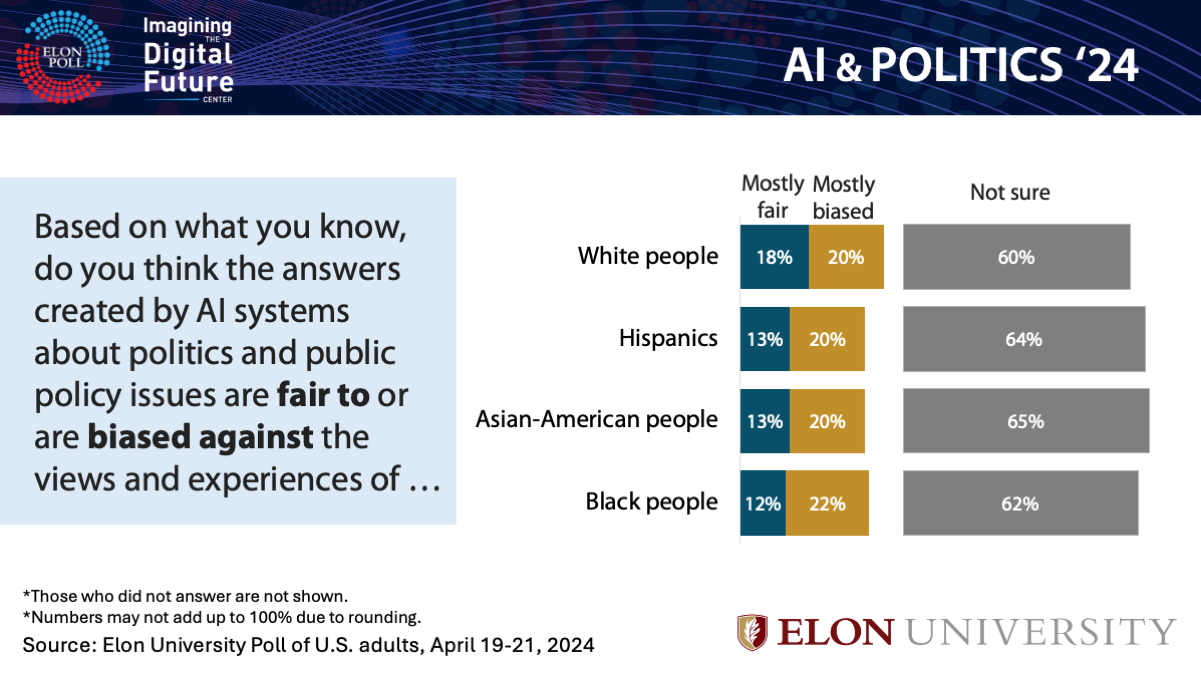
There are no clear, broad patterns in the answers to these questions about AI fairness and bias by different racial and ethnic groups. Black people are more likely than others to believe that the answers of AI systems on political issues are mostly biased against Black people. Some 33% of Black Americans say that, compared with 21% of White Americans and 19% of Hispanics. Black Americans are also more likely than other groups to believe AI systems are biased against Hispanics. Some 29% of Black adults say that, compared with 18% of Hispanic adults and 19% of White adults. It is interesting to note that when LLM users (who make up 23% of adults) answer these questions about bias they are more likely than non-users to think the models are mostly fair.
When it comes to broad questions about the nation’s political climate and election process, key divisions arise:
- 52% of Americans think most voters do NOT cast well-informed votes, compared with 33% who think they do.
- 43% say people usually agree on the facts even if they disagree politically, and the exact same share – 43% – think the opposite. Partisans are equally divided on this question.
- 55% say the vote-counting process is free and fair, while 31% think that does not describe the country’s situation well. Fully 79% of Democrats think that describes the country “very” or “somewhat” well, while 56% of Republicans think that does not describe the country well.
- 65% think the voter registration process allows all interested citizens to register and cast votes, while 22% think the opposite.

On these questions, the sharpest partisan differences emerge on the issue of whether the vote-counting process is free and fair. Some 79% of Democrats think that describes the country “very” or “somewhat” well, while 56% of Republicans think it does not describe the country well. On another issue, Democrats are more likely than Republicans to think most voters cast well-informed votes. Both sides are evenly split on the question of whether people usually agree on basic facts. Partisans also share similar views when it comes to whether the registration process allows all interested citizens to register and vote.
Asked about the administration of the voting process in this presidential election, 60% say they are “very” or “somewhat” confident people’s votes will be accurately cast and counted. On this question, 83% of Democrats are confident, while 60% of Republicans are not confident.

There are strong partisan differences on this question. Some 83% of Democrats are confident that people’s votes will be accurately cast and counted in the election, while 60% of Republicans think the opposite — they are not confident this will be the case. These figures are comparable to findings in Gallup polls on election integrity in recent election cycles.


